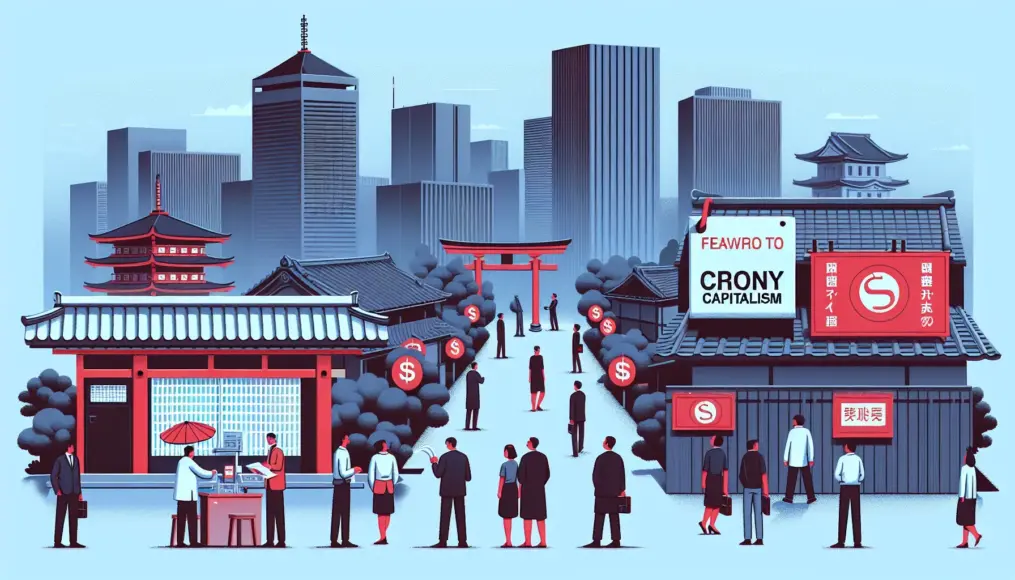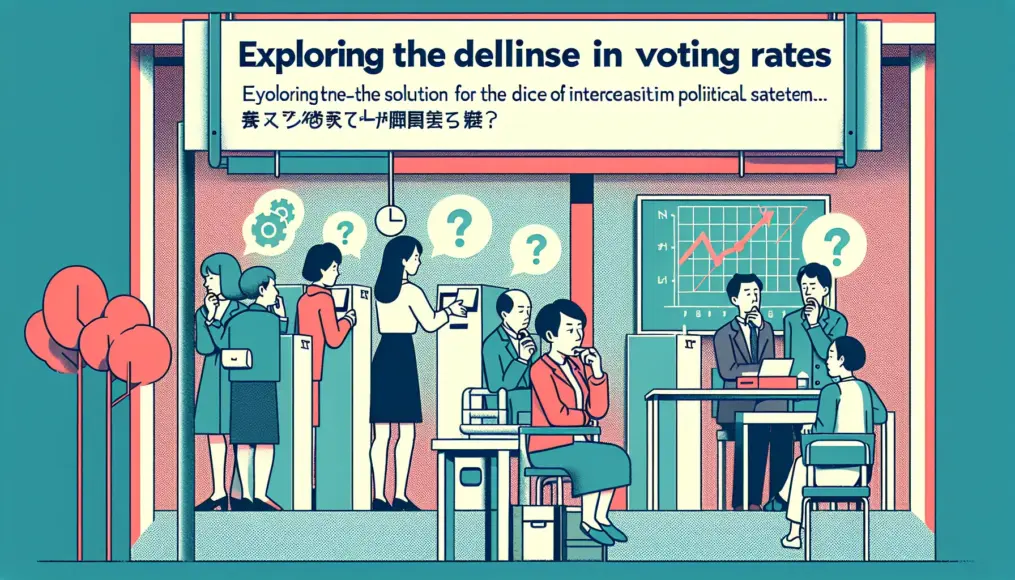Have you ever come across the term “crony capitalism”? This concept is crucial for understanding how politics and economics intertwine and influence our society. Looking back through history, we can see how certain individuals have gained privileges and monopolized resources, impacting society as a whole.
In this article, we’ll start by breaking down the fundamental ideas behind crony capitalism, exploring its effects on our economy and social structure, and discussing potential solutions. Specifically, let’s think together about how we, as citizens, can tackle this issue.
- We’ll explain the basic concept of crony capitalism and its historical background.
- We’ll examine the specific impacts it has on our economy and society.
- We’ll explore the importance of policy changes and citizen participation as potential solutions.
What is Crony Capitalism?
Crony capitalism refers to a system where specific individuals or groups wield significant influence, leveraging the economic and political frameworks to benefit their own interests. Understanding this concept is crucial for grappling with issues of inequality and corruption prevalent in modern society. Especially when resources and opportunities become concentrated within certain groups, competition is often stifled, impacting our lives in profound ways.
In this section, we will delve into the fundamental concepts of crony capitalism and explore its historical context. Let’s consider why this system emerged and how it became entrenched in society.
Understanding the Basic Concept
Crony capitalism describes a mechanism through which economic benefits are derived from particular relationships or connections. This can lead to an unfair competitive landscape, making it challenging for individuals to succeed based solely on merit and hard work. Typically, we see politicians or business leaders granting advantages to their close associates. Such scenarios can hinder healthy economic growth and erode public trust across society.
- Crony capitalism is a system of profit-making based on specific personal relationships.
- It creates an unfair competitive environment and can obstruct economic growth.
- There is a risk of undermining societal trust.
Historical Context
Crony capitalism has manifested in various forms throughout history. Particularly during times when privileged classes held power, those in authority often prioritized their own interests, resulting in common citizens facing disadvantages. This backdrop has become the root of contemporary inequalities in both economic and political spheres. By studying history, we can better understand current issues and find pathways to solutions.
- Historically, the power held by privileged classes has shaped crony capitalism.
- Instances of common citizens suffering disadvantages are often observed.
- Learning history can assist in understanding modern challenges.
The Impact of Crony Capitalism on the Economy
Crony capitalism has a significant influence on the economy, particularly in two key areas: the decline of market competition and the hindrance of economic growth. When personal relationships and connections take precedence, merit and innovation often go unrecognized, undermining a healthy competitive environment. This situation can have detrimental effects on the economy as a whole, making sustainable growth increasingly challenging.
In this section, we will delve into the effects of crony capitalism on market competition and explore the reasons it stifles economic growth. Understanding this issue is the first step toward finding effective solutions moving forward.
Decline of Market Competition
As crony capitalism takes hold, certain companies and individuals are given preferential treatment, making it difficult for new players to enter the market. This results in reduced competition and fewer choices for consumers. A vibrant competitive market is crucial for improving prices and quality, so this is a significant concern. Moreover, the lack of competition leads to stagnation in innovation, which ultimately drains the vitality of the entire economy.
- Certain companies are favored due to crony capitalism.
- New players struggle to enter the market.
- Declining competition hinders improvements in prices and quality.
Hindrance to Economic Growth
The decline in market competition also adversely affects economic growth. Companies may no longer feel the need to adopt new ideas or technologies, increasing the likelihood of missing out on growth opportunities. Societies where crony capitalism is entrenched often experience prolonged economic stagnation, impacting the development of the nation as a whole. In such circumstances, the standard of living for citizens may decline, leading to rising dissatisfaction within society.
This article has explored how crony capitalism diminishes market competition and stifles economic growth. Another related topic worth considering is the article titled “Exploring the Impact and Causes of Abenomics’ Failure!”. It offers valuable insights into how Abenomics policies have influenced the Japanese economy and the resulting social and economic changes, providing a deeper understanding of these interconnected issues. If you’re interested, be sure to check it out!
- Companies stop adopting new ideas.
- The risk of missing growth opportunities increases.
- This leads to rising dissatisfaction across society.
The Far-Reaching Impact on Society
Crony capitalism doesn’t just reshape the economy; it has extensive consequences for society as a whole. One of the most concerning outcomes is the widening social inequality and the erosion of trust within communities. When resources and opportunities become skewed in favor of certain individuals due to specific relationships or connections, it can undermine the overall harmony of society. This persistent imbalance can lead to increased division and discontent, ultimately threatening national stability.
In this section, we will delve into how crony capitalism contributes to growing social inequality and the loss of trust. Let’s explore how these issues affect our daily lives.
Growing Social Inequality
As crony capitalism gains ground, wealth and opportunities become concentrated among select individuals, exacerbating social inequality. This is particularly evident in areas like education and job selection, where connections often take precedence over merit and hard work. As a result, only certain groups benefit, undermining the sense of fairness in society and widening the gap between the affluent and the less fortunate. Moreover, limited economic opportunities can push those in poverty into even harsher circumstances.
- Wealth and opportunities concentrate among select individuals
- Connections are prioritized in education and job selection
- The sense of fairness in society diminishes, widening the gap
Erosion of Trust
Another significant issue stemming from crony capitalism is the loss of trust in society at large. When ordinary citizens witness certain individuals enjoying privileges, they begin to feel that “fair competition is non-existent.” This erosion of trust can breed skepticism toward politics and anxiety regarding economic activities, exacerbating the situation further. A lack of trust can weaken social cohesion, making cooperation and mutual support increasingly difficult.
- Trust in society as a whole diminishes
- More people feel that fair competition is lacking
- Distrust in politics and the economy rises
Solutions to Crony Capitalism
The issues stemming from crony capitalism are serious, but it’s crucial that we find solutions. In this section, we’ll explore the need for policy reforms and the promotion of civic engagement. Specifically, we’ll look at how governments and businesses can enhance transparency and foster fair competition. Additionally, we’ll consider how active citizen participation can help build a healthier society.
To counter crony capitalism, the first step is to change existing policies. There is a pressing need for measures that provide equal opportunities for all. Furthermore, it’s essential for citizens to raise their voices and engage in political and economic matters. These two approaches will serve as the foundation for achieving a sustainable society.
The Need for Policy Reform
Overcoming crony capitalism necessitates a thorough review of current policies. This includes establishing laws and systems that ensure transparency and promote competition. For instance, managing the bidding and contracting processes in a fair manner can prevent favoritism toward certain individuals. Policies that provide equal access to education and employment opportunities are equally important, as they create an environment where everyone can compete on an equal footing.
- We need to enhance policy transparency
- Fair bidding and contract management are crucial
- Policies that ensure equal access to education and job opportunities are necessary
Promoting Civic Engagement
Encouraging citizen participation is also vital in addressing crony capitalism. By expressing their opinions and influencing policy, citizens can contribute to building a better society. Effective methods include hosting workshops and forums to raise awareness of local issues. Moreover, actively participating in elections and public discussions can help restore trust in politics. When citizens engage, diverse voices are heard, paving the way for a more sustainable society.
- Increase opportunities for citizens to express their opinions
- Share local issues through workshops and forums
- Actively participate to restore trust in politics
Conclusion
In this article, we’ve delved into the concept of crony capitalism and its far-reaching impacts. We’ve highlighted how issues such as growing inequality and a loss of trust in our economy and society affect our daily lives. Furthermore, we emphasized the necessity of policy changes and encouraging civic engagement as concrete solutions to these challenges.
The problems associated with crony capitalism won’t be resolved overnight, but by raising our awareness and taking action, each of us can take the first step toward building a better society. It’s crucial to reflect on how we want to engage with our communities moving forward, armed with this understanding.
- Crony capitalism has extensive effects on the economy and society.
- Social inequality and the erosion of trust pose serious challenges.
- Policy reform and civic participation are key to finding solutions.
Let’s consider together what we can do to make our society a better place. We’d love to hear your thoughts and feedback in the comments!



Comment